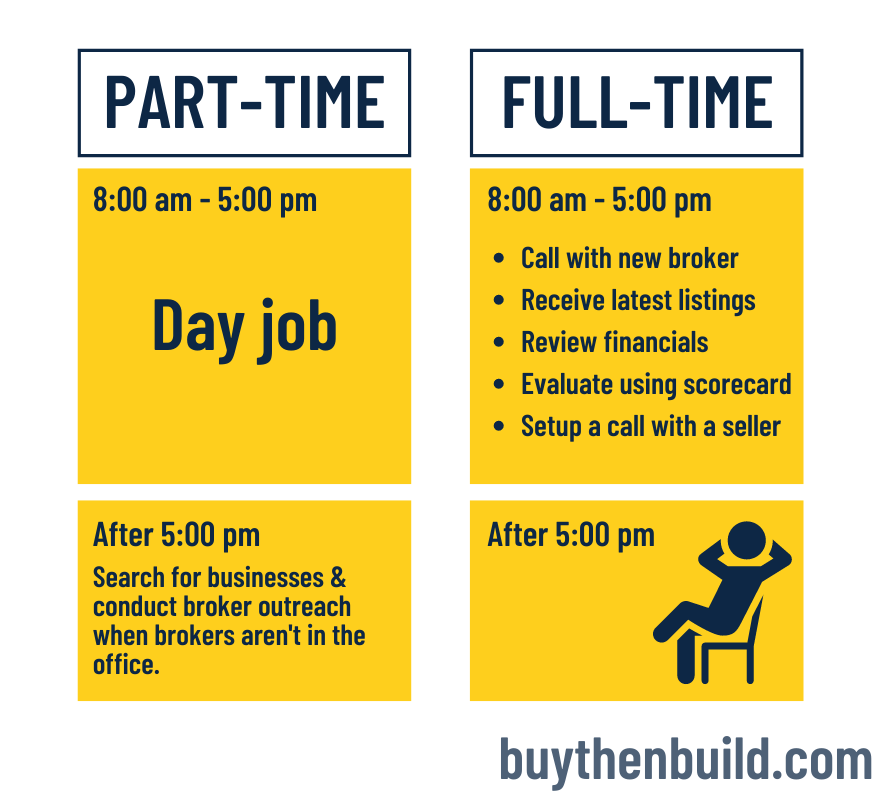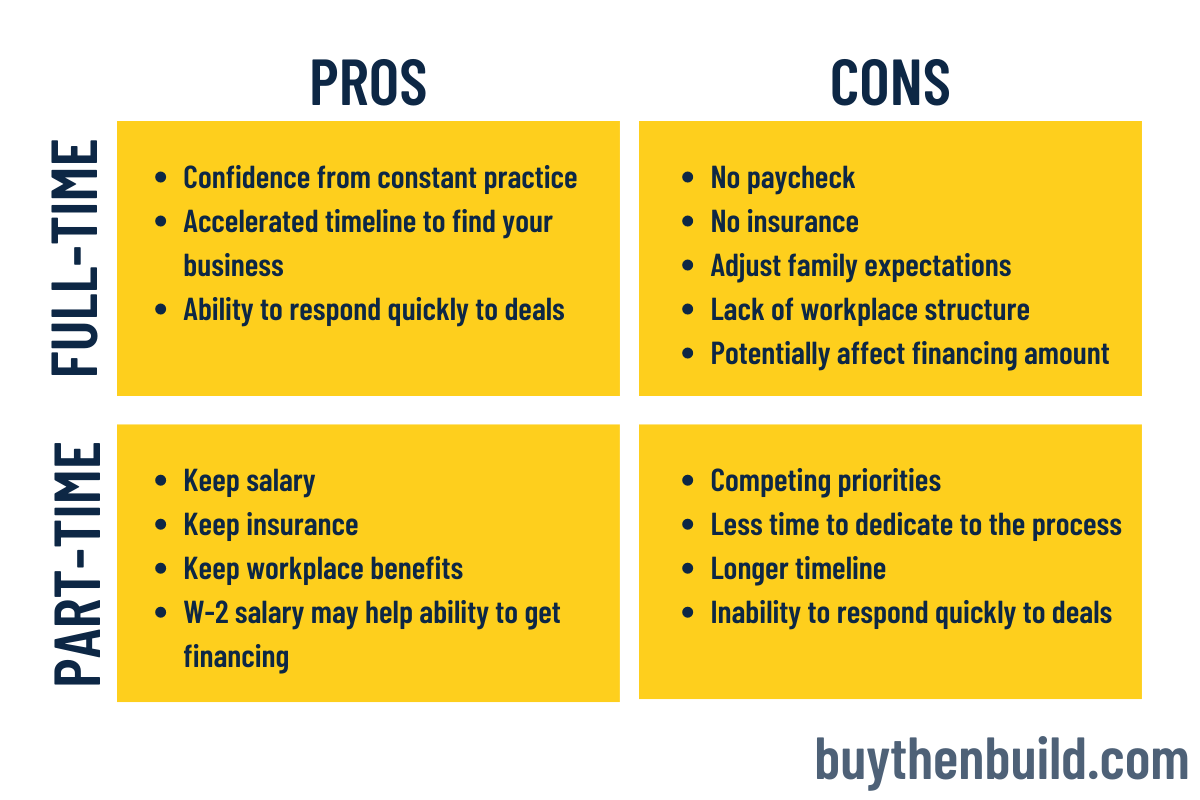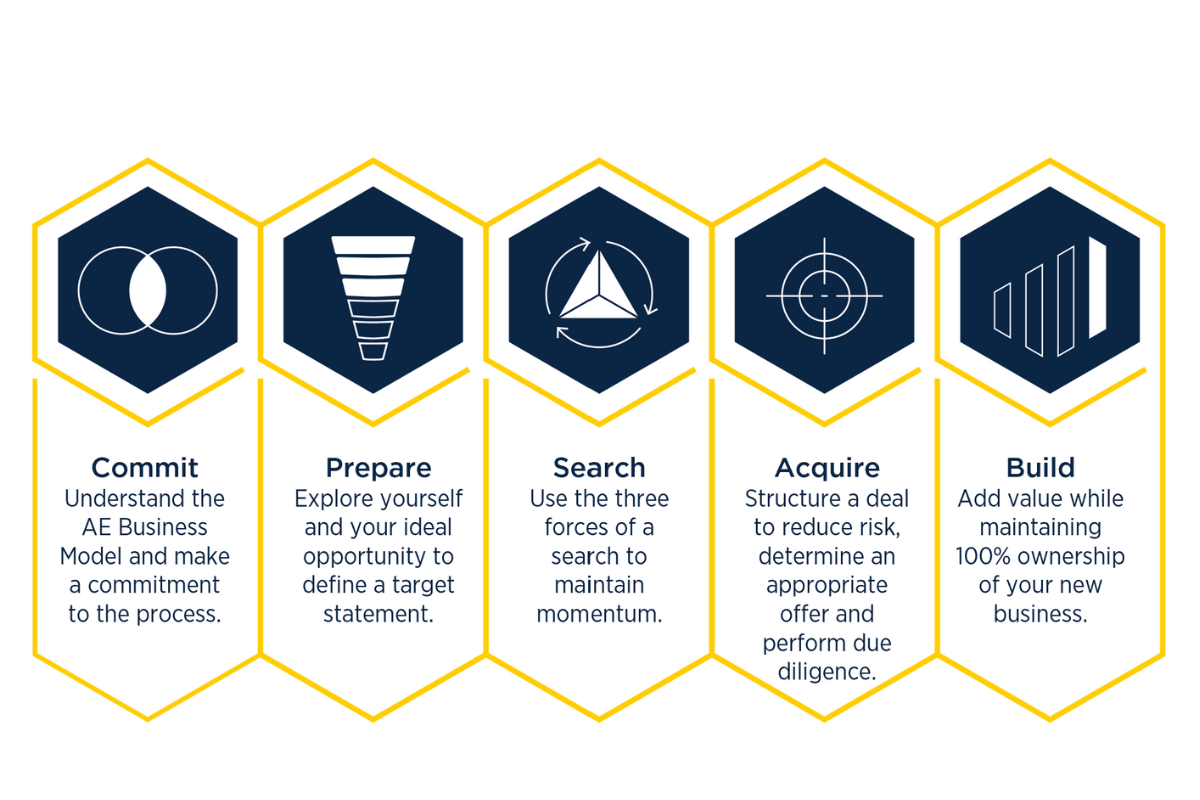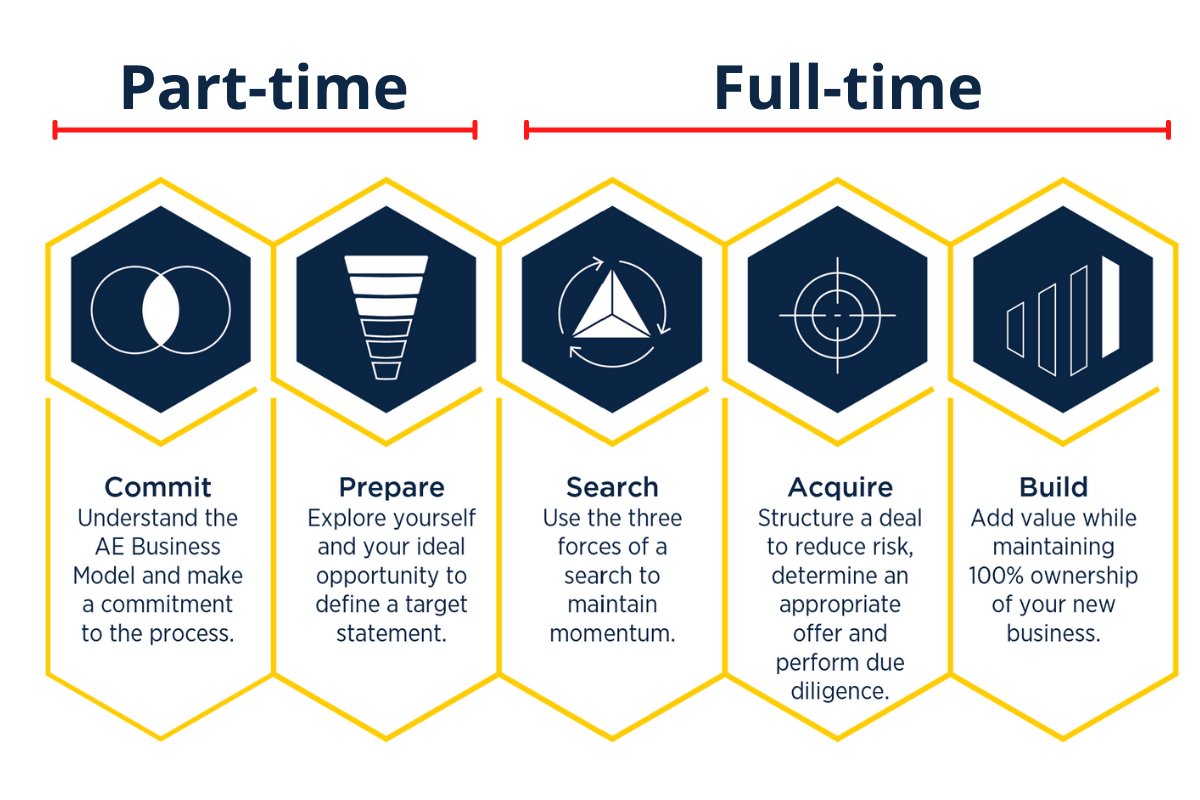One of the biggest questions we get in the Acquisition Lab is whether you should dedicate part-time or full-time effort to searching for a business to buy.
Is it like a side gig, where you can dedicate a couple hours in the evening to find your perfect business?
Or do you need to go full bore to really do it right?
These are really important questions, and they’re tough to answer in such a fragmented marketplace. However, I can speak to the merits of searching for a business part-time and full-time, as I purchased my first business while on a part-time search, then I purchased my second while searching full-time.
Today, I’m going to cover the pros and cons to approaching your search part-time versus full-time. I’ll also provide you with a framework to understand the big stages of the search process, so you know when it’s best to remain part-time and when to finally take the leap into full-time searching.
Searching for a Business: 3 Different Approaches
There are three different approaches you can take when searching for a business: part-time, full-time, and via a search fund.
Part-time search: A part-time search approach is when you hold onto your current full-time job, and you spend time outside of your normal working hours searching for a business to purchase. From broker outreach to evaluating deals, you’re doing this work after hours.
Full-time search: A full-time search approach is when you choose to leave your full-time job to dedicate your newly freed hours to searching for a business to purchase.
Pros and Cons: Full-time Versus Part-time
Now that you know what it looks like to run your search part-time versus full-time, let’s talk about the pros and cons.
Part-Time Search
Conducting your search part-time, you get the value of maintaining your current job along with the salary and benefits that accompany it. This alleviates the stress that many full-time searchers experience when funds run low with no timeline of it getting replenished.
The downsides to part-time search are:
- Competing priorities
- Less time to dedicate to the process
- Longer timeline
- Inability to respond quickly to deals
By juggling multiple priorities, there are other things pulling at your focus, time, and attention. Most of the time, this translates to less effort in the search process and, therefore, less results.
Here’s what I mean by inability to respond quickly to deals:
Let’s say a broker sends out a deal to her list at 1:00 pm (this typically happens sometime between 8:30 am and 5:00 pm). Within the first hour, there are 30 initial inquiries, and within the next hour, she’s already received emails from 12 people interested in setting up calls with the seller. By 3:00 pm, the broker stops accepting any more inquiries so she can schedule those 12 calls.
Now, if you get off work at 5:00 pm, you’ve already missed the bus.
Even though that business may have been perfect for you and matched your criteria, you’ve lost your chance simply because you weren’t able to get in line.
If you’re searching for a business part-time, you’re going to have a challenging time.
Not only do you lack the responsiveness that might be key to securing the business that’s right for you, but because your efforts are more drawn out, it may take you more time overall to finally find your business.
Full-Time Search
On the other hand, dedicating yourself to a full-time search allows you to respond to deals quickly and put your name in the hat for any businesses you want to make an offer on. It also makes broker outreach and deal evaluation habits you can practice every day, if not multiple times a day.
By going through these habits more frequently, you will get more confident in the process – quicker. You’ll gain confidence in reaching out to brokers, developing rapport with them, reviewing deals and figuring out if they’re good or not, and submitting offers on businesses you’re interested in. This confidence and ability to cut through the noise will allow you to spend less and less time on each deal, freeing up time to look at more deals.
Sheerly from a numbers point of view, you’ll ultimately be positioned to shorten the time it’ll take to land a business that fits your criteria.
The benefits of a full-time search are:
- Confidence from constant practice
- Accelerated timeline to find your business
- Ability to respond quickly to deals
Now, it’s not all sunshine and roses.
When you choose to conduct a full-time search, you potentially lose the paycheck and benefits that make having a job so great. A salary and insurance benefits provide you with security and the reassurance that your (and possibly your family’s) basic needs are taken care of.
Before taking the leap, you’ll need to spend additional time preparing beforehand. You’ll have to consider your budget, replacement insurance, the effect on your family, if the decrease in pay will affect your ability to get financing, and more.
5 Stages of the Search Process
Now, let’s back up.
We can’t answer the question “Full-time or part-time?” without first addressing what goes into the search process. There are five stages of the search process. They are:
- Commitment
- Preparation
- Search
- Acquisition
- Build
Sharpening the Axe
The first two stages, Commitment and Preparation, allow you to build the foundation of confidence you need to ultimately purchase and grow your business.
90% of people who start looking for a business don’t even purchase a business, and this is largely because they didn’t take the time to adequately commit to and prepare for the process.
Here’s the deal.
When you buy your business, from day one, you’re now the leader. With 20 years or 0 years of experience behind you, you’re it. That’s a big leap you’re going to have to take, and that’s why the search process doesn’t start with the third phase, Search. It starts with Commitment and Preparation first.
In fact, by going through the Commitment and Preparation phases, one of two things will happen:
You’ll either realize you don’t want to purchase a business anymore, eliminating the “part-time v. full-time” debate entirely.
Or, you’ll be able to shave down your search time significantly.
In my experience working with searchers in the Acquisition Lab, I’d say you can shorten your search timeline from the standard 24 months to six months.
Have Your Cake and Eat It, Too
From my perspective, the “part-time v. full-time” debate isn’t an either-or situation.
My recommendation is to approach the Commitment and Preparation phases part-time, while retaining the benefits of your current employment. Then, if you decide at the end of the Preparation phase that you’re ready to move forward, you should move into the subsequent stages, Search, Acquisition, and Build, on a full-time basis.
Look Before You Jump
Thinking about taking the leap? Here are a few questions to ask yourself first:
- How much income will I need to maintain my standard of living?
- Do I need to find replacement insurance?
- Is my partner/spouse comfortable with me leaving my W-2 job?
- Will the lenders prefer my W-2 income?
- Am I ready to set up the necessary infrastructure to succeed in my full-time search?
- Will I get bored if I’m not working full-time?
- Are there ways for me to continue having “wins” during the initial stages of my search when deal flow is slow?
If you’re struggling with any of these questions, don’t worry. We help you navigate these challenges and more in the Acquisition Lab.
Ready to acquire a business in the next 12 months? The Acquisition Lab is your first stop. Reach out to us today and get on the fast track to becoming an acquisition entrepreneur.






